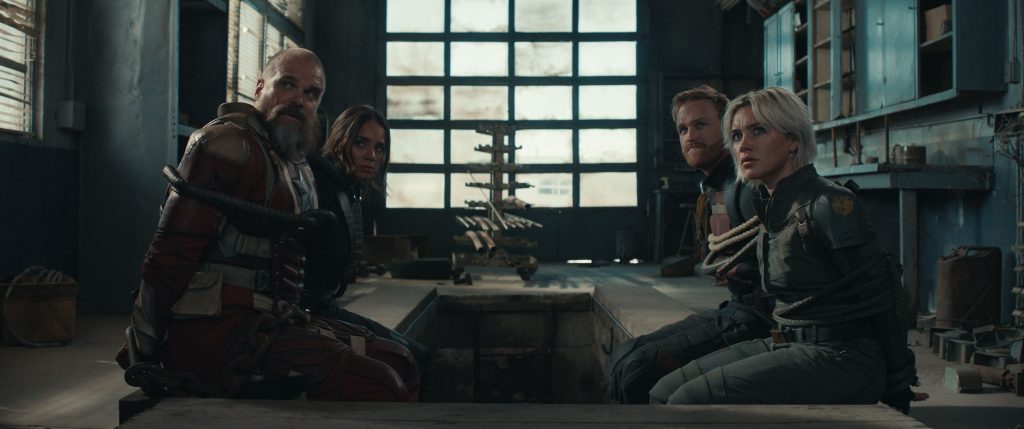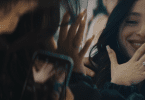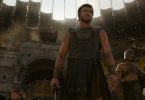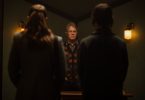The Marvel Cinematic Universe has struggled to find its footing in a post-Endgame world. New characters have been introduced and then forgotten, plotlines have led to dead ends, and the world building has continued to expand to size that can no longer be reasonably managed. The current state of the MCU is far from the lean days of the OG Avengers. These are no doubt dark times for Marvel Studios, and Thunderbolts* is here to face that darkness head-on, literally. Like Guardians of the Galaxy, the Thunderbolts are a team of washed up dysfunctional antiheroes who find themselves having to work together to not only save themselves but the world at large. That basic idea is nothing new to the superhero genre, but where Thunderbolts* excels is how it embraces its darker themes to create a more compelling narrative that makes you care about these characters. In looking at the darkness within themselves, Thunderbolts* becomes a shinning light during the MCU’s darkest days.
Ever since the Avengers disbanded there has been a massive hole left in the public eye. Who is willing to step up as cosmic and multi-universal threats become more and more common? CIA director Valentina Allegra de Fontaine has been secretly working on a superhuman “Sentry” project that would create the ultimate superhero but so far all it has produced is failure. When public hearings threaten to uncover her behind-the-back dealings, she orders all evidence be destroyed. That includes the handful of operatives she’s used in the past such as Yelena Belova, John Walker (U.S. Agent) , Ghost, and Taskmaster. She gathers them all together in one place under the guise of a mission but they catch on to her double cross before they kill each other. Now with a common enemy, the previously solo assassins reluctantly decided to team up in order to expose de Fontaine and take her down. Oh, and they’re joined by some guy named Bob who just so happened to show up with them all at the same time as well.
Thunderbolts* is the culmination of years of MCU films and series. Bucky has been around since Captain America: The First Avenger. Yelena and her father, Red Guardian, were introduced in Black Widow alongside Taskmaster. The Disney+ series The Falcon and the Winter Soldier gave us John Walker and de Fontaine. Ghost was originally the villain in Ant-Man and the Wasp. There is a lot of Marvel Studios catching up to do if you don’t want to be left in the dark as it’s far from being its own little self contained adventure. That being said, the film is firing on all cylinders as it brings these misfits together.

At the heart of the film is Florence Pugh’s Yelena. It has been years of mission after mission, and she has become complacent and bored with her life, struggling to find purpose and joy in anything. Her sister Natasha is dead and she barely speaks with her father, not to mention all the trauma from being trained as a Black Widow assassin in the Red Room as a child. Yelena doesn’t really know how to heal from all this pain and mostly just pushes it deep down inside her. All of the other antiheroes carry a similar burden and pain. They’re all deeply flawed and believe that they can get through it by superhuman force. Violence always solves everything, right? Thunderbolts* differentiates itself from other MCU entries by embracing the trauma bonds between the characters. And it’s all because of Bob.
Bob is the result of what happens when a mentally ill person is given superpowers. Sure, they might turn out to become a hero like Sentry, but there is also a darker and more violent and unstable villain lurking in the shadows. In Bob’s case, it’s the Void. The Void preys on people by trapping them inside their darkest fears. He omits an endless blackness that sweeps across the streets of New York, devouring any and all who are in its path, instantly turning them into permanent shadows. The Void isn’t scary or powerful because he’s another world-ending threat to humanity, which he very much is. He’s terrifying on a personal level because he makes you relive the things you’re afraid of over and over again as if you’re trapped in a hell that’s tailor-made for you. Rather than just giving us more superheroes, Thunderbolts* shines because it explores what makes us all human.
There is still plenty of humor and action sequences that have become the staple of MCU films. The dynamic between Florence Pugh and David Harbour is hilarious, and the team up of these unlikely allies works well. There’s an action scene where they all finally seem to work in tandem with each other that is very reminiscent of the early days of the Avengers and it can’t help but bring a smile to my face. But it’s how the film addresses mental heath and trauma that sets it apart from the rest and makes it one of the best entries in the MCU in recent memory. Not only that but it feels like Marvel Studios is finally starting to reel things back and properly build a storyline worth telling across multiple films again.
Thunderbolts* strikes when the iron isn’t so hot, but it absolutely hits its mark. The film is reflective of the dark days that have plague the MCU since Avengers: Endgame but shows that there is still plenty of opportunities for surprises and reinvention even after 35 films and 12 television series.
-
Thunderbolts*
Summary
Like Guardians of the Galaxy, the Thunderbolts are a team of washed up dysfunctional antiheroes who find themselves having to work together to not only save themselves but the world at large. That basic idea is nothing new to the superhero genre, but where Thunderbolts* excels is how it embraces its darker themes to create a more compelling narrative that makes you care about these characters. In looking at the darkness within themselves, Thunderbolts* becomes a shinning light during the MCU’s darkest days.







